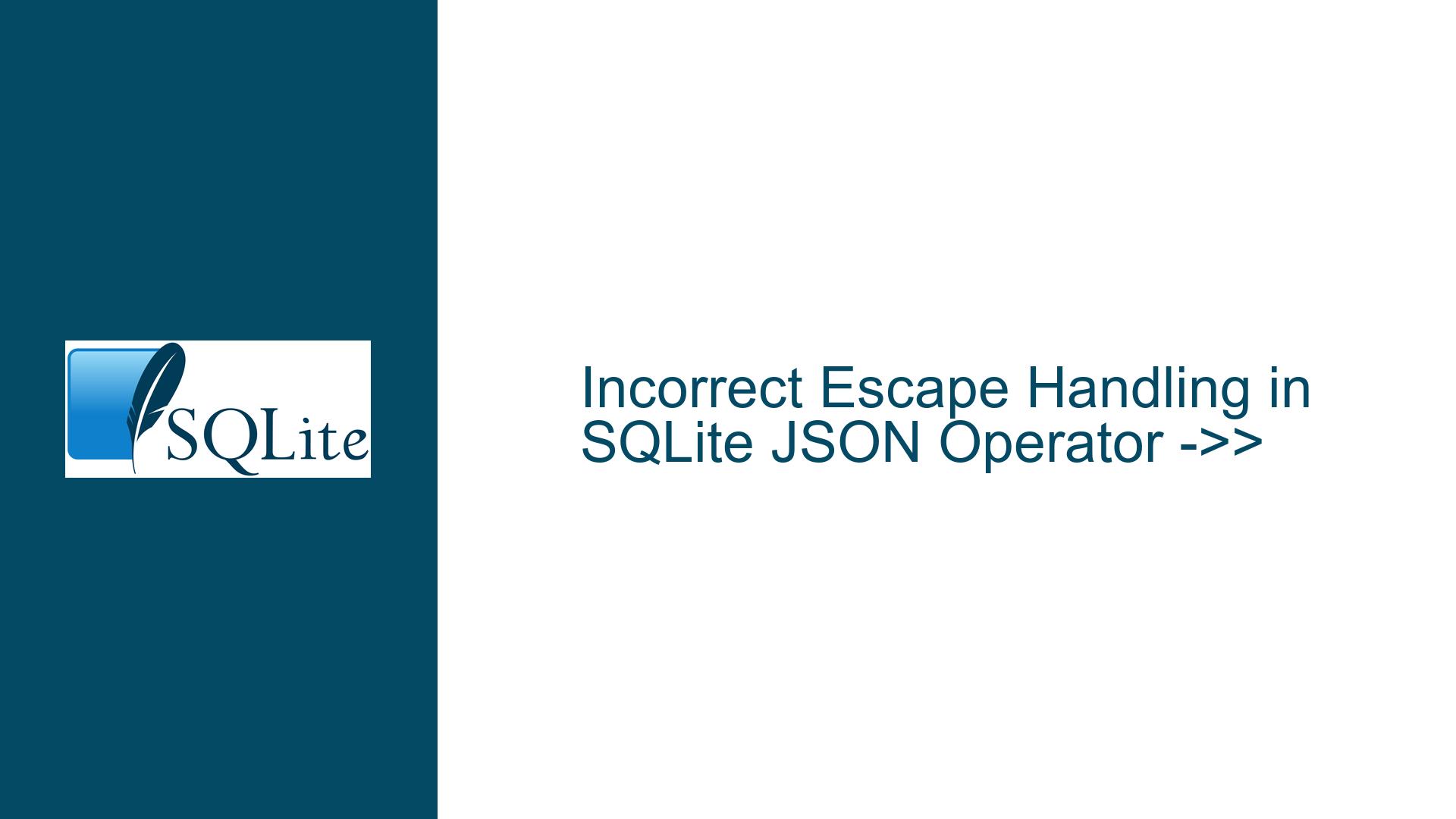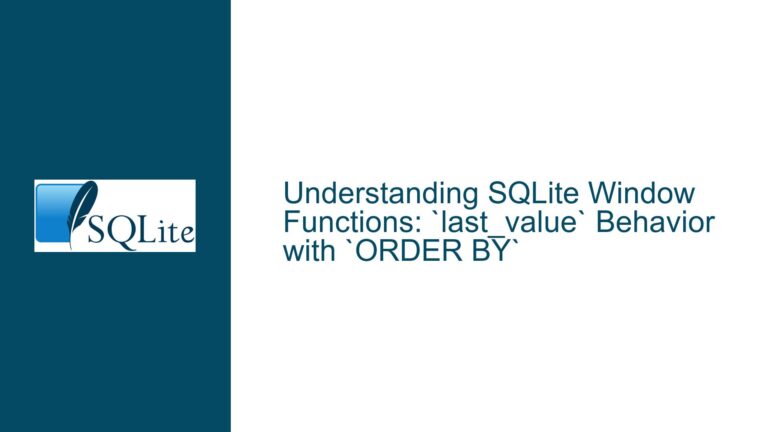Incorrect Escape Handling in SQLite JSON Operator ->>
JSON Escape Sequence Parsing Issues in SQLite’s ->> Operator
Issue Overview
The SQLite JSON operator ->> is designed to extract values from JSON objects using a key or path expression. However, there are two significant issues with how escape sequences are handled in this operator. The first issue pertains to the improper decoding of escape sequences in JSON object keys during JSON parsing. This results in object members being keyed by the literal token contents between the double-quotes in the raw JSON, rather than by the parsed key string. For example, when querying a JSON object with keys that contain escape sequences, such as \u004B (which represents the character ‘K’), the operator fails to decode these sequences correctly. This leads to unexpected behavior where the keys are treated as literal strings rather than their intended Unicode representations.
The second issue involves the escape handling on the right-hand side of the ->> operator. The operator does not properly handle escape sequences in the key or path expression provided as the right-hand argument. This means that when attempting to access a JSON object using a key that contains escape sequences, the operator fails to interpret the escape sequences correctly. This issue is particularly problematic when dealing with keys that contain special characters, such as double quotes or dollar signs, which are commonly used in JSON path expressions. The lack of proper escape handling in the right-hand side of the operator can lead to situations where certain keys become inaccessible, especially when the key starts with a dollar sign or contains a double quote.
These issues are not just minor inconveniences; they represent a significant deviation from the expected behavior as outlined in the SQL standard, specifically the ISO/IEC TR 19075-6 technical report. This report implies that JSON-style escaping should be permitted in JSON path expressions, which is how similar functions, such as json_value in Microsoft SQL Server, operate. The current behavior in SQLite’s ->> operator thus falls short of the standard, leading to potential compatibility issues and unexpected results when working with JSON data that contains escape sequences.
Possible Causes
The root cause of these issues lies in the way SQLite’s JSON parsing and the ->> operator handle escape sequences. JSON, as a data format, allows for the use of escape sequences to represent special characters within strings. These escape sequences are typically prefixed with a backslash (\) and followed by a specific sequence of characters that represent a particular character or symbol. For example, \u004B represents the Unicode character ‘K’, and \" represents a double quote within a string. When parsing JSON, these escape sequences should be decoded into their corresponding characters before the JSON object is processed.
In the case of SQLite’s ->> operator, it appears that the escape sequences in JSON object keys are not being decoded correctly during the JSON parsing phase. This means that when the JSON object is parsed, the keys retain their literal escape sequences rather than being converted into their intended characters. As a result, when the ->> operator attempts to match a key, it is comparing the raw, unparsed escape sequence with the key provided in the query, leading to mismatches and unexpected results.
The second issue, involving the right-hand side of the ->> operator, is likely due to a similar oversight in the operator’s implementation. The operator does not seem to handle escape sequences in the key or path expression provided as the right-hand argument. This means that if a key contains an escape sequence, the operator will not decode it before attempting to match it against the keys in the JSON object. This can lead to situations where keys that contain escape sequences are not accessible, as the operator is effectively looking for a key that includes the literal escape sequence rather than the decoded character.
Another potential cause of these issues is the way SQLite’s JSON implementation handles JSON path expressions. JSON path expressions are used to traverse nested JSON objects and arrays, and they often include quoted field keys to access specific elements. However, the current implementation does not seem to support escape sequences within these quoted field keys. This means that if a key contains a double quote or another special character that requires escaping, the path expression will fail to match the key, as the escape sequence is not being decoded correctly.
Troubleshooting Steps, Solutions & Fixes
To address these issues, it is important to first understand the expected behavior of JSON escape sequences and how they should be handled in both the JSON object and the ->> operator. JSON escape sequences are defined in the JSON specification, and they should be decoded into their corresponding characters during the JSON parsing process. This means that when a JSON object is parsed, any escape sequences in the keys or values should be converted into their intended characters before the object is processed further.
In the case of SQLite’s ->> operator, the first step in troubleshooting is to verify whether the JSON object is being parsed correctly. This can be done by examining the parsed JSON object and checking whether the escape sequences in the keys have been decoded properly. If the escape sequences are not being decoded, this indicates a bug in the JSON parsing logic, and the issue should be reported to the SQLite development team for further investigation.
If the JSON object is being parsed correctly, the next step is to examine the behavior of the ->> operator. Specifically, it is important to check whether the operator is correctly handling escape sequences in the key or path expression provided as the right-hand argument. This can be done by testing the operator with various keys that contain escape sequences and observing whether the operator is able to match the keys correctly. If the operator is not handling escape sequences correctly, this indicates a bug in the operator’s implementation, and the issue should be reported to the SQLite development team.
In the meantime, there are a few workarounds that can be used to mitigate these issues. One approach is to manually decode the escape sequences in the JSON object before using the ->> operator. This can be done by using a custom function or script to parse the JSON object and convert any escape sequences into their corresponding characters. Once the JSON object has been parsed correctly, the ->> operator can be used to extract the desired values.
Another approach is to avoid using escape sequences in the keys of the JSON object altogether. Instead, keys can be chosen that do not require escaping, or alternative representations can be used for special characters. For example, instead of using a key that contains a double quote, a different character or symbol can be used that does not require escaping. This approach may not always be feasible, especially when working with JSON data that is generated by external systems, but it can help to avoid issues with the ->> operator in some cases.
For more complex scenarios where escape sequences are necessary, it may be possible to use a different JSON function or operator that does not have the same limitations as the ->> operator. For example, the json_extract function in SQLite can be used to extract values from a JSON object using a JSON path expression. This function may handle escape sequences differently than the ->> operator, and it may be possible to use it as an alternative in some cases.
In conclusion, the issues with escape sequence handling in SQLite’s ->> operator are significant and can lead to unexpected behavior when working with JSON data. These issues are likely due to bugs in the JSON parsing logic and the implementation of the ->> operator, and they should be reported to the SQLite development team for further investigation. In the meantime, there are several workarounds that can be used to mitigate these issues, including manually decoding escape sequences, avoiding the use of escape sequences in keys, and using alternative JSON functions or operators. By understanding the root causes of these issues and exploring potential solutions, it is possible to work around these limitations and continue to use SQLite’s JSON capabilities effectively.






